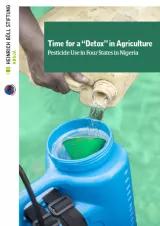Time for a “Detox” in Agriculture
Nigeria’s agricultural sector is a major pillar of the country’s economy and accounts for about 22% of GDP, compared to oil and gas (9.5%), manufacturing (9.7%) and trade (16.1%). Over 75% of the active labour force is employed in agriculture, directly or indirectly. Agriculture in Nigeria faces many challenges, including the loss of soil fertility, conflicts related to land use and access to the means of production, pressure on natural resources, and climate change. This has left the country unable to meet the demand of domestic and export markets. Government policies have therefore focused on increasing productivity. However, these mainly promote conventional industrial agriculture that requires high external inputs, such as pesticides and artificial fertilizers.
Yet the proper registration of pesticides, their sustainable management and the promotion of alternatives are clearly lacking, as a 2020 report by the Heinrich Böll Foundation Abuja Office has highlighted. Many pesticides still registered in Nigeria are proven to cause chronic health effects and show very high environmental toxicity. About 40% of the registered pesticides in Nigeria have been withdrawn from the European market, partly due to toxicity, persistence or lack of data. Some of these, including carbofuran and diazinon, have been found in high levels in green vegetables. Nigeria has no comprehensive policies in place to fund, implement or promote research into organic farming, agroecology or any other sustainable agricultural strategy. The First Draft of the Integrated Pest Management Plan focuses on the “safe use” of pesticides and lacks clear advice on alternative, scientifically sound pest-control strategies.
Building on the 2020 report, and to capture issues beyond the registration status of pesticides and the policy environment in Nigeria, this field survey sought to find out from farmers, extension officers and local pesticide dealers the types of pesticide in use across the country and to bring to the fore on-the-ground challenges related to pesticide use. Specifically, the objectives of the rapid assessment survey were to:
1. assess the extent and types of pesticide use
2. determine the influence of agro-dealers and extension officers on pesticide use
3. identify challenges related to safety measures
4. identify crops that should be prioritized for better pest and disease management.
The general purpose of this study is to provide evidence to support a process of withdrawing highly hazardous pesticides from the Nigerian market, based on their toxicity to human health and the environment, and to promote safer alternatives to chemical pesticides for crop and pest management. The study provides guidance for policymakers to prioritize the pesticides and crops that require attention.

